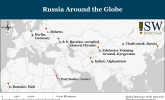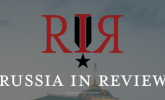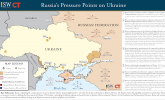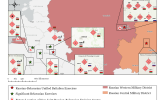Russia in Review: September 22 – October 5, 2021
October 7, 2021 - ISW PressSerbian President Alexander Vucic exploited Kosovo’s implementation of a new border crossing law to frame Kosovo Serbs as victims of ethnic discrimination and provoke a regional crisis on September 20, 2021. Kosovo’s government-imposed license plate regulations requiring Serbian cars entering Kosovo to receive temporary Kosovar license plates – a reciprocal measure of how Serbian authorities have regulated Kosovar cars entering Serbia for several years – on September 20. Kosovo ethnic Serbs blocked two border crossings with Serbia in northern Kosovo to protest this policy on September 20. Kosovar riot police deployed to the roadblocks and reportedly used tear gas against Serb protesters on September 20. Vucic decried Kosovar police uses of force against ethnic Serb protesters, claiming that Serbs in Kosovo suffered a “brutal attack.” Likely ethnic Serb protesters committed arson against a Kosovo vehicle registration office that did not cause casualties on September 25.








